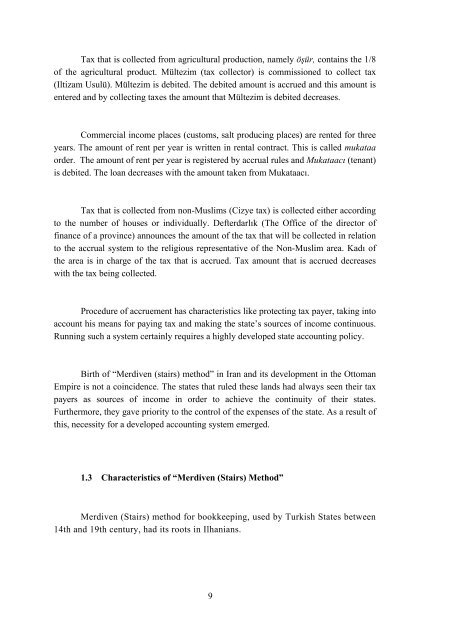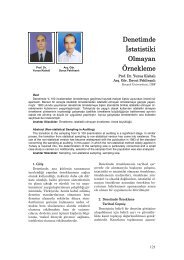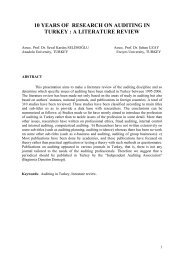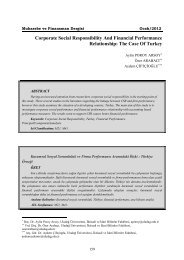an accounting system used between 14th and 19th centuries in the ...
an accounting system used between 14th and 19th centuries in the ...
an accounting system used between 14th and 19th centuries in the ...
Create successful ePaper yourself
Turn your PDF publications into a flip-book with our unique Google optimized e-Paper software.
Tax that is collected from agricultural production, namely öşür, conta<strong>in</strong>s <strong>the</strong> 1/8<br />
of <strong>the</strong> agricultural product. Mültezim (tax collector) is commissioned to collect tax<br />
(Iltizam Usulü). Mültezim is debited. The debited amount is accrued <strong>an</strong>d this amount is<br />
entered <strong>an</strong>d by collect<strong>in</strong>g taxes <strong>the</strong> amount that Mültezim is debited decreases.<br />
Commercial <strong>in</strong>come places (customs, salt produc<strong>in</strong>g places) are rented for three<br />
years. The amount of rent per year is written <strong>in</strong> rental contract. This is called mukataa<br />
order. The amount of rent per year is registered by accrual rules <strong>an</strong>d Mukataacı (ten<strong>an</strong>t)<br />
is debited. The lo<strong>an</strong> decreases with <strong>the</strong> amount taken from Mukataacı.<br />
Tax that is collected from non-Muslims (Cizye tax) is collected ei<strong>the</strong>r accord<strong>in</strong>g<br />
to <strong>the</strong> number of houses or <strong>in</strong>dividually. Defterdarlık (The Office of <strong>the</strong> director of<br />
f<strong>in</strong><strong>an</strong>ce of a prov<strong>in</strong>ce) <strong>an</strong>nounces <strong>the</strong> amount of <strong>the</strong> tax that will be collected <strong>in</strong> relation<br />
to <strong>the</strong> accrual <strong>system</strong> to <strong>the</strong> religious representative of <strong>the</strong> Non-Muslim area. Kadı of<br />
<strong>the</strong> area is <strong>in</strong> charge of <strong>the</strong> tax that is accrued. Tax amount that is accrued decreases<br />
with <strong>the</strong> tax be<strong>in</strong>g collected.<br />
Procedure of accruement has characteristics like protect<strong>in</strong>g tax payer, tak<strong>in</strong>g <strong>in</strong>to<br />
account his me<strong>an</strong>s for pay<strong>in</strong>g tax <strong>an</strong>d mak<strong>in</strong>g <strong>the</strong> state’s sources of <strong>in</strong>come cont<strong>in</strong>uous.<br />
Runn<strong>in</strong>g such a <strong>system</strong> certa<strong>in</strong>ly requires a highly developed state <strong>account<strong>in</strong>g</strong> policy.<br />
Birth of “Merdiven (stairs) method” <strong>in</strong> Ir<strong>an</strong> <strong>an</strong>d its development <strong>in</strong> <strong>the</strong> Ottom<strong>an</strong><br />
Empire is not a co<strong>in</strong>cidence. The states that ruled <strong>the</strong>se l<strong>an</strong>ds had always seen <strong>the</strong>ir tax<br />
payers as sources of <strong>in</strong>come <strong>in</strong> order to achieve <strong>the</strong> cont<strong>in</strong>uity of <strong>the</strong>ir states.<br />
Fur<strong>the</strong>rmore, <strong>the</strong>y gave priority to <strong>the</strong> control of <strong>the</strong> expenses of <strong>the</strong> state. As a result of<br />
this, necessity for a developed <strong>account<strong>in</strong>g</strong> <strong>system</strong> emerged.<br />
1.3 Characteristics of “Merdiven (Stairs) Method”<br />
Merdiven (Stairs) method for bookkeep<strong>in</strong>g, <strong>used</strong> by Turkish States <strong>between</strong><br />
<strong>14th</strong> <strong>an</strong>d <strong>19th</strong> century, had its roots <strong>in</strong> Ilh<strong>an</strong>i<strong>an</strong>s.<br />
9

















